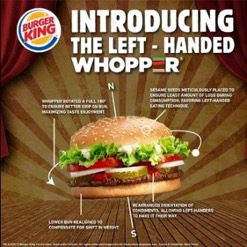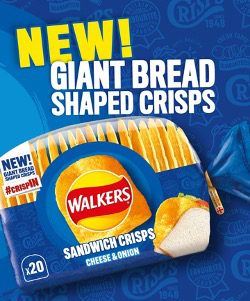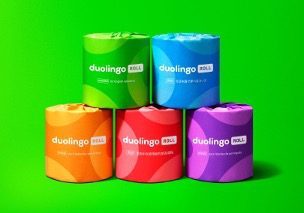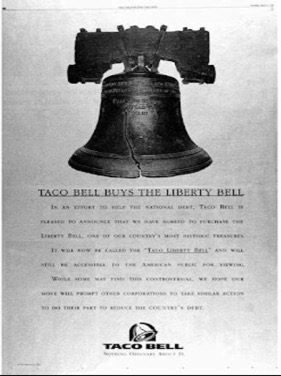
“Don’t believe everything you read in the news” was some of the first advice that you may remember getting as a kid. Years later, “Any news is good news”—which every good PR person knows is not the case—is a key phrase that, at first, can lead many astray in their PR careers.
Not everyone seems to learn those same lessons as every April Fools' Day, brands and their PR teams use this tiny window to engage audiences with humor and creativity. The result? A lot of fake news that baffles customers. When these pranks misfire, they can lead to frustration, confusion, and even damage to a company’s reputation.
The lesson? Think deeply about the potential impact to an audience. Not all jokes are good ones.

A notorious April Fools' prank gone wrong comes from Burger King in 1998, when the company ran a full-page advertisement in USA Today announcing the introduction of a “Left-Handed Whopper” tailored for the 32 million left-handed Americans. BK claimed that all the condiments were rotated 180 degrees to better suit left-handed customers.
What seemed like a cute idea to drive press led to a surge of customers visiting Burger King outlets, eager to try the new “Left-Handed Whopper.” Despite this, many others requested the “original” right-handed version, causing widespread confusion among patrons and staff alike.
While the prank garnered significant attention, it highlighted how consumers can take brand messages at face value and the potential pitfalls of misleading advertising, even in jest.
10 Other Brands with April Fools Fails
Walkers’ ‘bread-sized’ crisps (2022): For April Fools, the U.K.-based Walkers Crisps announced the launch of  bread-sized crisps, so snack enthusiasts could now enjoy the perfect crisp sandwich. While some consumers were amused, others were momentarily misled, leading to a mix of reactions before the company clarified the joke.
bread-sized crisps, so snack enthusiasts could now enjoy the perfect crisp sandwich. While some consumers were amused, others were momentarily misled, leading to a mix of reactions before the company clarified the joke.
Volkswagen vs. ‘Voltswagen’ (2021): In March, just days before April Fools’ Day, Volkswagen issued a press release claiming it would rebrand its U.S. operations to “Voltswagen,” highlighting its commitment to electric vehicles. Major news outlets took the announcement seriously, leading to widespread reporting. When journalists realized this was an April Fools' joke gone wrong, they, and the public, criticized the company for misleading info—especially since the auto industry was already under scrutiny regarding environmental commitments.
Duolingo’s ‘toilet paper’ language lessons (2021):

The language-learning platform Duolingo announced (on April 1) a new product: toilet paper printed with foreign language lessons. According to the brand, this would allow users to learn while attending to their bathroom needs. While some users found the prank amusing, others felt it trivialized the serious commitment required to learn a new language, leading to mixed reactions.
Tinder’s ‘height verification’ feature (2020): Dating app Tinder announced a new “height verification” feature, claiming it would verify users’ heights to ensure honesty in profiles. While intended as a joke, the prank received backlash from users who felt it played into superficial dating standards and body image issues, prompting Tinder to clarify its intentions.
Elon Musk's ‘bankruptcy’ announcement (2018): The Tesla CEO infamously tweeted that Tesla had gone “completely and totally bankrupt,” even suggesting that he had been found passed out against a Tesla Model 3 surrounded by “Teslaquilla” bottles. Given Tesla’s financial issues at the time, investors and the public deemed the prank inappropriate, even leading to a dip in the company’s stock price. Will Musk try this again in 2025?
Tesla Goes Bankrupt
Palo Alto, California, April 1, 2018 -- Despite intense efforts to raise money, including a last-ditch mass sale of Easter Eggs, we are sad to report that Tesla has gone completely and totally bankrupt. So bankrupt, you can't believe it.— Elon Musk (@elonmusk) April 1, 2018
2016: Google’s “mic drop” (2016): Google introduced a “mic drop” feature in Gmail, which sent emails with an added animated GIF of a Minion dropping a microphone. But, the feature also muted the email thread, preventing further replies from appearing in the user’s inbox. Users inevitably used the “mic drop” on their important emails, including job applications and professional communications, leading to frustration. The backlash was quick, so Google disabled the feature and issued an apology within hours.
BMW’s “magnetic tow technology” (2015): BMW claimed to develop a technology that allowed other vehicles to be magnetically towed behind a BMW, improving fuel efficiency for the trailing car. Despite the implausibility, some customers contacted dealerships about the feature. The prank received mixed reactions, with some praising its creativity and others questioning its appropriateness.
 Pepsi’s “friend finder” app (2015): Pepsi introduced a mock app called “Friend Finder,” claiming it could help users locate their friends in crowded places by tracking the Pepsi cans they were holding. Neat idea, bad execution. The prank triggered deep privacy concerns among consumers and advocacy groups, leading to criticism over the implications of tracking individuals’ locations, even as a joke.
Pepsi’s “friend finder” app (2015): Pepsi introduced a mock app called “Friend Finder,” claiming it could help users locate their friends in crowded places by tracking the Pepsi cans they were holding. Neat idea, bad execution. The prank triggered deep privacy concerns among consumers and advocacy groups, leading to criticism over the implications of tracking individuals’ locations, even as a joke.
Hooters’ ‘win a Toyota’ contest (2001): A Hooters restaurant in Florida held a contest promising a new "Toyota" to the waitress who sold the most beer. The winner, Jodee Berry, was blindfolded and led to the parking lot to claim her prize: a “toy Yoda” from Star Wars. The recipient sued the company for fraudulent misrepresentation and breach of contract, eventually receiving a settlement that allowed her to purchase a car of her choice.
Taco Bell’s “Liberty Bell” purchase (1996): Lastly but infamously, Taco Bell announced its purchase of the historic Liberty Bell, and intended to rename it the “Taco Liberty Bell” as a move to help reduce the national debt.
As a result, outraged citizens inundated the National Park Service and Taco Bell with calls protesting the commercialization of a national treasure. The company later revealed it was a hoax, but the incident left a sour taste for many.
April Fools’ campaigns can backfire due to poor timing, misreading the audience, or underestimating how literally consumers might interpret news. With the current prevalence of fake news and rise of social media, if humor doesn’t land as intended, it leads to PR challenges and erodes consumer trust.
While April Fools’ Day offers a platform for brands to showcase creativity, it’s crucial to tread carefully. Missteps can lead to confusion, backlash, and damage to a brand’s reputation. Thoughtful planning and a deep understanding of the audience are essential to executing pranks that entertain without offending.
Lindsey Bradshaw is a freelance writer, PR, and communications consultant at Lindsey Bradshaw Communications. For 17 years, she’s helped Series A-D tech startups drive awareness and achieve business goals through creative and effective communications.
